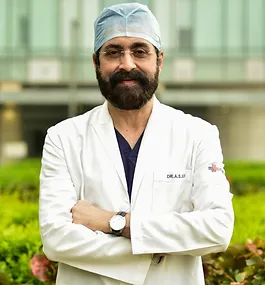Most people think of a liver transplant as a single dramatic event – a surgery where a diseased liver is replaced with a healthy one. They imagine the surgeon as the only hero of the story.
But here’s the truth no one talks about:
A liver transplant doesn’t begin in the operation theatre and it doesn’t end there either.
The real journey starts months (sometimes years) before surgery and continues for the rest of a patient’s life. And the person quietly steering this entire process?
Not just the surgeon.
The hepatologist.
In fact, without a skilled hepatologist, even the best surgeon can only do half the job. Let’s dig into why their role is so critical – before and after a liver transplant.
Table of Contents
ToggleWhy a Hepatologist Matters – More Than You Think
Most people don’t even know who a hepatologist is. They’ve heard of cardiologists for heart issues, nephrologists for kidneys, but “hepatologist” sounds like some rare specialist they’ll never meet.
Here’s the simple definition:
A hepatologist is a liver expert. They deal with every aspect of liver health – from hepatitis, fatty liver, and cirrhosis to advanced end-stage liver disease where transplant becomes the only hope.
But when it comes to transplants, their role is much deeper. They are the one deciding whether a transplant is even needed, to preparing the body for it, and later making sure the new liver thrives.
The Pre-Transplant Stage: Building the Foundation
A liver transplant is never a “walk in, get a new liver, walk out” situation. There’s an intense pre-transplant phase where the hepatologist works almost like a detective and a coach rolled into one.
Here’s what happens behind the scenes:
1. Deciding if a Transplant is Truly Needed
Not every severe liver problem requires a transplant.
Sometimes, patients are rushed towards surgery when strong medication or a targeted procedure could still save their own liver.
A hepatologist’s first job is to be absolutely sure that the disease has reached a point where a transplant is the only way forward.
They study test results, imaging scans, and the patient’s overall health. They calculate scores like MELD (Model for End-Stage Liver Disease) which helps rank the urgency.
Many times, they delay the transplant by stabilizing the liver with treatment – giving the patient precious extra months or even years before going under the knife.
What most families don’t realize is – rushing into a transplant without this careful evaluation can actually be riskier than waiting.
2. Preparing the Body for a Complex Surgery
Liver transplant is one of the most complicated surgeries in medicine. The patient’s body needs to be in the best possible shape to survive it.
The hepatologist works on:
- Nutritional correction: Liver disease causes severe malnutrition, which slows healing.
- Controlling infections: Even a small, hidden infection can turn deadly post-surgery.
- Optimizing other organs: Heart, kidneys, lungs – all must be checked and managed.
It’s almost like tuning every system of a car before a long road trip.
3. Matching the Patient With the Right Donor
This part is far more complex than just matching blood groups.
The hepatologist:
- Coordinates compatibility tests to ensure the donor liver won’t be rejected.
- Manages the waiting list, especially in deceased donor cases, so the sickest patients are prioritized fairly.
- Guides families through the process of finding a living donor, if that’s the chosen route.
This is not just medical work – it’s emotional counseling, too. Families are usually under extreme stress at this point, and the hepatologist becomes the anchor.
4. Preventing Last-Minute Surprises
Even a minor overlooked issue can derail the surgery. For example, an untreated dental infection or an unnoticed blood clot can create massive complications during or after transplant.
The hepatologist acts like a safety net, doing final clearances, repeat tests, and ensuring there are zero hidden risks before giving the green light to the surgical team.
During the Transplant: Silent Partner of the Surgeon
On the day of surgery, the spotlight is usually on the transplant surgeon – and rightly so. They perform the technical magic of replacing the liver.
But the hepatologist doesn’t disappear.
They are there, often in the operating room, monitoring the patient’s labs, guiding on fluid management, and advising on complex decisions like whether to remove excess fluid or adjust certain medications mid-surgery.
It’s a quiet, invisible role, but it keeps the surgeon’s work safer.
The Post-Transplant Phase: A Lifelong Commitment
Here’s the part that most people underestimate: getting a new liver is just the beginning.
The real challenge starts after the transplant.
A new liver is a foreign organ to the body. Left unmonitored, the immune system will attack it, leading to rejection.
The hepatologist’s role here is almost like a lifelong guardian.
1. Balancing Immunosuppressant Medications
Patients must take special drugs – immunosuppressants – to stop their body from rejecting the new liver.
But these drugs have a razor-thin safety margin:
- Too little, and the liver gets attacked.
- Too much, and the patient becomes prone to deadly infections or kidney damage.
The hepatologist constantly adjusts these doses, especially in the first few months when the balance is extremely fragile.
It’s not guesswork – it’s a science mixed with years of experience.
2. Watching for Silent Warning Signs
Sometimes, the earliest signs of rejection are silent – a tiny change in liver enzyme levels, a mild fever, or subtle fatigue.
Patients often miss them.
But a hepatologist, reviewing lab trends week after week, can catch these signals early and act before things spiral.
This is why regular post-transplant follow-ups are non-negotiable.
3. Protecting the Whole Body, Not Just the Liver
Post-transplant care is not only about the liver.
Immunosuppressants can weaken bones, affect kidneys, and even raise cancer risk.
The hepatologist monitors every organ, adjusts medications, and coordinates with other specialists like nephrologists or endocrinologists when needed.
3. Guiding Lifestyle and Social Reintegration
A transplant patient often struggles with questions like – when can I go back to work, what diet is safe, can I travel, what about alcohol, what about pregnancy? Surgeons may not always have the time for these. Hepatologists usually step in with practical, customised advice, not only from medical books but also from experience of seeing hundreds of patients before.
4. Mental and Emotional Recovery
Many patients struggle emotionally after a transplant.
Guilt about taking a loved one’s liver, fear of rejection, or anxiety about the future can create hidden stress.
While not a psychologist, a hepatologist plays a supportive role here – often being the first to notice when a patient needs mental health support.
Why Surgeons Alone Can’t Handle It
Here’s a common misconception:
“Once the transplant is done, the surgeon will handle everything.”
But transplant surgeons are focused on the surgery itself – and they should be. They can’t realistically monitor dozens of patients for years, adjusting medications week by week or catching early complications.
The hepatologist steps in as the long-term manager, ensuring the transplant’s success beyond the hospital walls.
Think of it like this:
- The surgeon builds the house (the transplant).
- The hepatologist maintains it for life.
Challenges Hepatologists Face
While their role is crucial, hepatologists deal with hurdles most people never see:
- Patients disappearing after surgery: Some stop follow-ups once they feel “normal” only to return later with life-threatening rejection.
- Medication non-compliance: Skipping even a single dose of immunosuppressants can undo months of healthy progress.
- Societal myths: Families sometimes rely on home remedies or often believe myths that clash with medical advice.
- Financial strain: Long-term medications and tests can be expensive, and many patients struggle to keep up.
A good hepatologist doesn’t just treat the liver – they fight these real-world battles with patients and families.
oyo88 login
The Lifelong Partnership
A liver transplant isn’t a one-time event. It’s a lifelong relationship between patient and hepatologist.
In the first year, follow-ups might be weekly. Later, they might reduce to every few months. But they never stop entirely.
Patients often describe their hepatologist as a guide who helped them “learn to live again” after the surgery.
What Patients Should Know
For anyone facing liver transplant, one important understanding is this: your relationship with your hepatologist may actually matter more than with your surgeon. The surgeon will perform the operation brilliantly, but it is the hepatologist who will walk with you before and after.
- Do not hide symptoms or experiment with alternative remedies without telling your hepatologist. They need the full picture.
- Stick to follow-up schedules even when you feel fine. Many problems start silently.
- Understand that medicine changes are not trial-and-error – they are careful adjustments based on experience.
- Use the hepatologist as a guide for daily life doubts. They usually have the best sense of what is safe in your unique case.
The Bottom Line
The success of a liver transplant is never measured just by how well surgery went.
It is also measured by whether patient is thriving five, ten, or twenty years later.
And that success depends as much on hepatologist as it does on surgeon.
They are steady hand https://across-car.es/ behind the scenes, navigating complex medical, emotional, and practical challenges that come with such a life changing procedure.
So, next time you hear about liver transplant, please remember:
It’s not only about replacing organ.
It’s about rebuilding life – and hepatologist is the one who makes sure that new life has strong foundation to stand on.
If you or someone you know is facing liver disease or planning a transplant, reach out to Dr. A.S. Soin, one of the most trusted names in liver care and transplant in India. His team combines surgical excellence with long-term medical guidance for the best possible outcomes.








